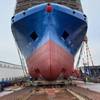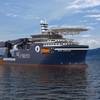Higher viscosity bunker fuels do not automatically contain more harmful elements than lighter ones, according to ExxonMobil Marine Fuels (EMMF), which has recently been supplying 500 centiStokes fuel in response to customer demand.
Emphasizing that quality and safety must be prime considerations with all fuel supplied, irrespective of viscosity, EMMF says the two crucial prerequisites for using 500 cSt fuel are the ability to heat it to a sufficiently high temperature to inject it into the vessels' engines, and the provision of purification equipment able to deal with the higher specific gravity of the product.
The fuel must be maintained above its minimum pumping viscosity while in storage awaiting use. Storage tank heating coils are required, which are able to maintain the fuel at a stored temperature at or above 45 degrees C. Modern purifier systems are capable of ensuring that the fuel is effectively and sufficiently cleaned. Finally, the ship's main engine fuel oil pre-heaters must be able to raise the fuel to between 140 and 155 degrees centigrade. At these temperatures the new fuel is at the typical engine fuel injection viscosity of between 15 and 10cSt. The additional heating required to use the 500cSt fuel should be easily covered at sea by the vessel's exhaust gas boiler. In port, the boiler will typically consume extra fuel to maintain oil storage tank temperatures. But EMMF points out that, given the saving in the initial cost of the 500cSt product and the limited in-port time of many vessels today, there is the potential for significant savings to be made. Many shipowners are now able to benefit from the possible cost savings involved in using heavier fuel without impairing the performance of their vessels. EMMF says that shipowners whose vessels can use the fuel may realize considerable economies over the course of a vessel's annual operational life.
Featured videos

Inmarsat Enhances Service to Drive Digitalization

Unlock Onboard Data Efficiencies

Tracking Foreign Vessels Working in the U.S. Jones Act Market
Subscribe for
Maritime Reporter E-News
Maritime Reporter E-News is the maritime industry's largest circulation and most authoritative ENews Service, delivered to your Email five times per week









